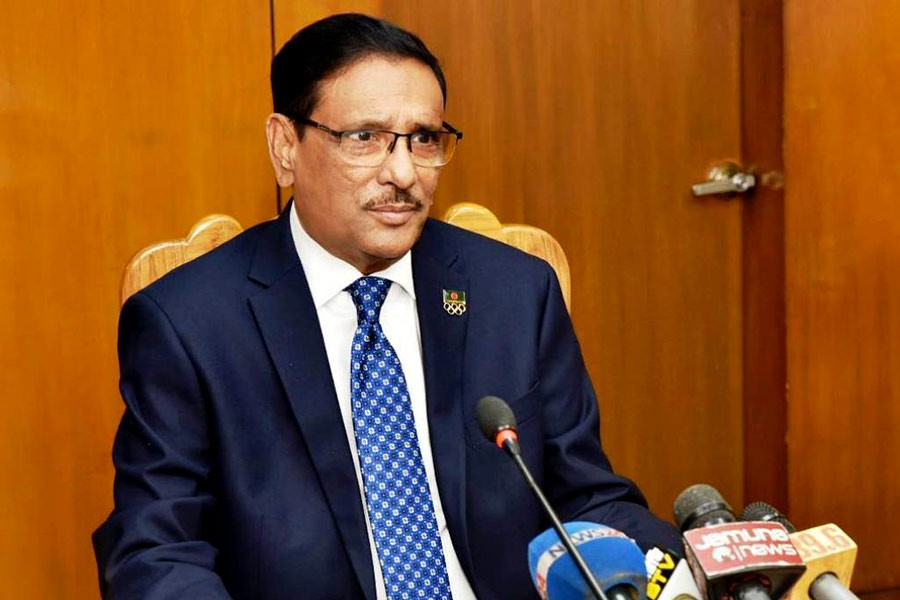Awami League General Secretary Obaidul Quader has said BNP Secretary General Mirza Fakhrul Islam Alamgir's ‘ill-motivated’ comment on press freedom is an exposure of BNP's new conspiracy against media and journalism.
Quader, also the road transport and bridges minister, made the allegation in a statement issued on Monday, reports BSS.
He urged BNP to shun the path of conspiracy to play a responsible role in keeping trust in the spirit of the Liberation War.
“If BNP can do so, Bangladesh's path of progress and prosperity will be freed from obstacles,” he observed.
“Otherwise, BNP will have to face severe disaster,” he said.
“Under the leadership of successful statesman Prime Minister Sheikh Hasina, Bangladesh is marching forward towards prosperity and this development spree will continue in the coming days too,” he hoped.
"No one will be able to keep suppressed us," he said referring to the landmark March 7 speech of Father of the Nation Bangabandhu Sheikh Mujibur Rahman.
The minister said purpose-oriented falsehood and propaganda of BNP leaders are being aired every day on talk shows on different television channels.
“Even after that they are raising ridiculous questions over freedom of the press,” he said.
"We want to firmly say that the sky of press freedom has been opened under the leadership of successful statesman Sheikh Hasina," he said.
“Now not only state-run television channels but also private-run TV channels are getting the facilities for commercial broadcasting by using Bangabandhu Satellite,” he mentioned.
Once state-run Bangladesh Television (BTV) was the only electronic media in Bangladesh, he said, adding that Sheikh Hasina was the first to approve private-run television channels.
“In continuation of that the vast door of media has been opened so that around 50 private channels as well as online TVs, IP TVs are now operating in the country,” he said.
Over 1000 daily, weekly and monthly newspapers and online news portals are also in Bangladesh and programmes of all political parties are being published in those media in detail, he added.
Apart from that, the government took the initiative to formulate the "Mass Media Employees Act" for increasing the dignity of journalists and establishing their rights, he said.
But, during the BNP tenure, the dignity and rights of journalists were considered under Labour Act, he mentioned.
During BNP tenure, the minimum social status of journalists was not protected, he said.
He said talks of press freedom don't suit BNP rather it sounds like the proverb "The devil listening to the Scriptures".
BNP has become bankrupt and perplexed as its top leadership has been sentenced by the court on charges of corruption and embezzling money of orphans, he said.
“Isolated BNP's only weapon is now falsehood and rumour,” he observed.
Quader said the people didn't forget that 16 journalists including BBC journalist Manik Chandra Saha, Khulna Press Club President and Dainik Janmabhumi editor Humayun Kabir Balu were killed during the regime of the 'evil' BNP-Jammat alliance (2001-2006).
During the period, he said, over 500 cases were filed against journalists while 800 incidents of carrying out attacks on journalists occurred.
Even several foreign journalists including British television 'Channel 4' crew - journalist Zaiba Malik and Italian cameraman Bruno Sorrentino were arrested and tortured, he added.
Many journalists were made accused deliberately in incidents of terrorist attacks and that is why 'Reporters Without Borders' had announced Bangladesh as the most dangerous state for journalists during the BNP regime, he recalled.
He said the talks of press freedom don't suit the party which was formed by autocrat Ziaur Rahman who seized state power by illegally declaring himself as the country's president through announcements on radio and television by taking journalists as hostages on gun barrels.
BNP has always been misusing freedom of expression by spreading propaganda and rumours against the Awami League, which had led the country's movement for independence, and distorting the history of the great Liberation War, the key foundation of national unity, he said.
Quader questioned BNP on what they had done for the expansion and flourishing of media and for the interests and welfare of journalists when the party was in power.
Rather BNP misused state power to prevent the flourishing of media and choke the voice of journalists and the country didn't forget it, he said.


